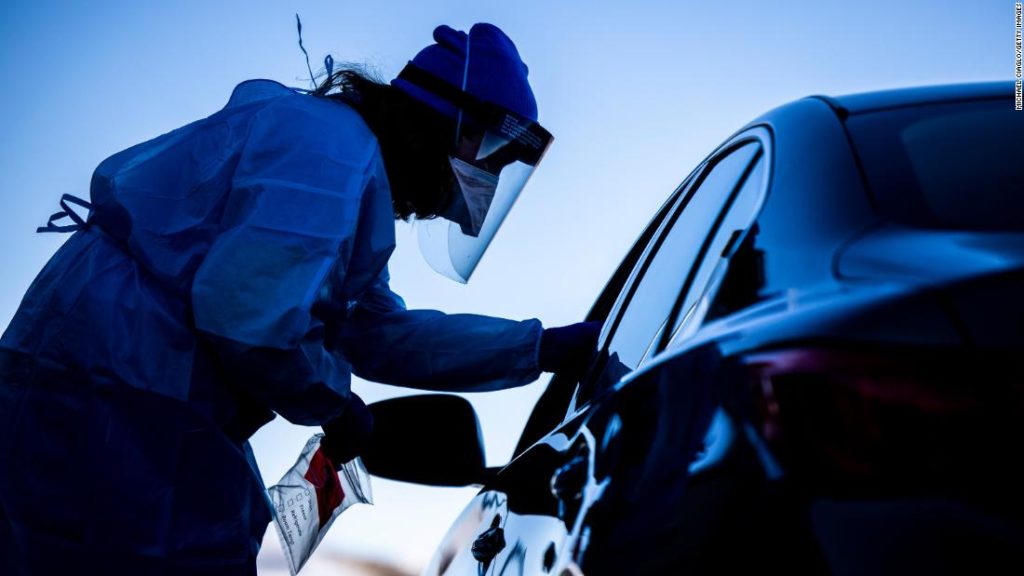Kentucky Gov. Andy Beshear said the state was seeing a “real and significant increase in cases and our positivity rate from people’s gatherings around the holiday.”
“This surge that we’re in right now is at least twice the rate, the seriousness, of the previous surges that we have seen,” the governor added. “This is our most dangerous time.”
Colorado’s state epidemiologist Dr. Rachel Herlihy on Friday warned of “early signs” of a rise in Covid-19 cases. “We are starting to see the impact of the holidays show up in our data,” she said. Health experts believe about one in 105 residents are currently contagious, Herlihy added.
“We continue to see a large percentage of Colorado’s population actively infected with Covid-19 and having the potential to transmit infection to each other, so contact between individuals continues to be high risk in this state,” Herlihy said.
It’s been a warning repeated across other states since the start of the New Year.
Arkansas’ governor said earlier this month the state was “certainly in the surge after Christmas.” And Mississippi officials said on Monday the state had experienced more Covid-19 patients in the ICU than ever before and was bracing for another rise in virus numbers following the holidays.
“We do strongly anticipate another surge following the holidays,” State Health Officer Dr. Thomas Dobbs had said. “It’s kind of been a recurring theme, it’s not something that should be too surprising. And this is also occurring when we have full ICU rooms, our hospitals are really overburdened.”
“So I do think this is an event that will probably lead to a significant spreading,” he added.
It’s been a deadly week in the US
“Public Health reported over 200 daily deaths this week,” officials said in a news release. “For comparison, the county on average has approximately 170 deaths each day from all other causes combined, including heart disease, cancer, stroke, diabetes, car crashes, suicides, and homicides.”
CDC shoots down reports of ‘USA variant’
Meanwhile, more than 60 cases of the Covid-19 variant first identified in the UK have now been identified in eight US states, according to data from the CDC.
The CDC said the number does not represent the total number of cases circulating in the country, but only those that have been found by analyzing positive samples. While the variant appears to spread more easily, there’s no evidence that it’s any more deadly or causes more severe disease, the agency said.
Academic researchers also said they were puzzled by the reports, adding there is no evidence that variant versions of the virus are driving its spread in the US.
“I do not know of a variant that has been identified in the US that could be responsible for the rise we are seeing,” said Scott Hensley, an expert on viruses and immunity at the University of Pennsylvania.
“There are a lot of reasons why the infection rates have increased over the fall and winter,” he added. “The rise in cases does not necessarily need a genetic explanation.”
States call non-traditional vaccinators in for help
Food and Drug Administration Commissioner Dr. Stephen Hahn said Friday he was encouraging states to broaden the criteria for who can be vaccinated against Covid-19, as some states have utilized only about 30 to 35% of the current vaccines they have, he added.
In other parts of the country, health systems are pulling from a well of newly trained, nursing, medical and dental students to aid in the effort. And others are looking to retired health care workers who have the skills to administer vaccines and aren’t actively attending to Covid-19 patients.
Fauci: Second Covid-19 vaccine dose ‘critical’
Receiving the second dose of the Moderna of Pfizer Covid-19 vaccine is essential for optimal protection, Dr. Anthony Fauci said on Friday.
“The second dose is absolutely critical,” he said. One dose of either vaccine, Fauci added, “has not been proven to be efficacious to the degree that we want, and we don’t know how long the protection lasts.”
“Whatever you’re hearing, one dose of the Moderna and one dose of the Pfizer is not optimal,” he said. “Optimal is one dose of Pfizer, followed in 21 days by the boost. Or one dose of Moderna followed in 28 days with a boost if you want optimal protection and optimal durability.”
Moderna says it believes the second dose of its vaccine can be effectively administered between 21 to 42 days after the first dose, a spokesperson for the company told CNN.
When asked if Moderna would be able to produce enough additional vaccine to get second doses administered on day 28, the company declined to directly answer.
CNN’s Gisela Crespo, John Bonifield, Lauren Mascarenhas, Naomi Thomas, Betsy Klein, Jim Acosta, Maggie Fox, Michael Nedelman and Melissa Alonso contributed to this report.
You may also like
-
UK coronavirus variant has been reported in 86 countries, WHO says
-
NASA technology can help save whale sharks says Australian marine biologist and ECOCEAN founder, Brad Norman
-
California Twentynine Palms: Explosives are missing from the nation’s largest Marine Corps base and an investigation is underway
-
Trump unhappy with his impeachment attorney’s performance, sources say
-
Lunar New Year 2021: Ushering in the Year of the Ox

